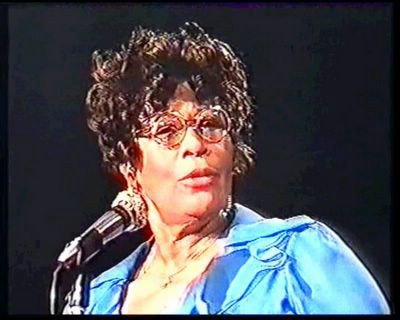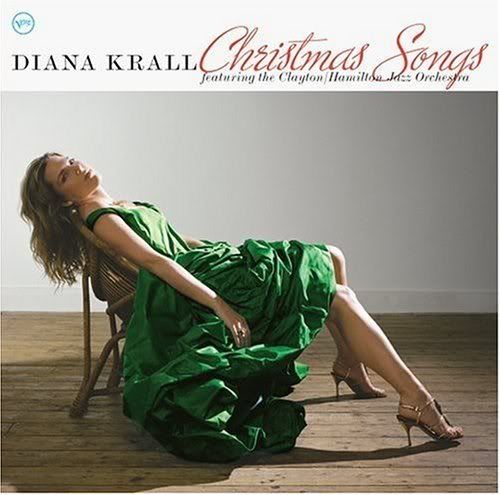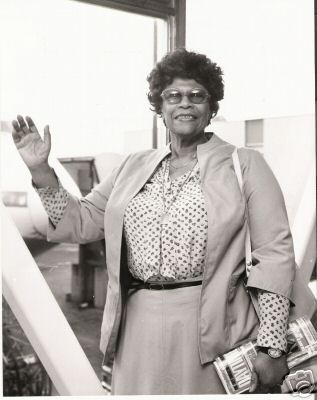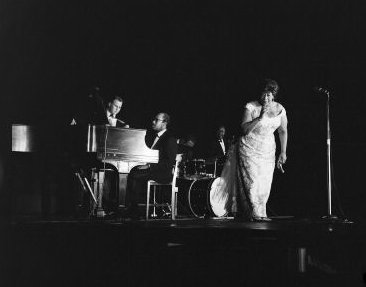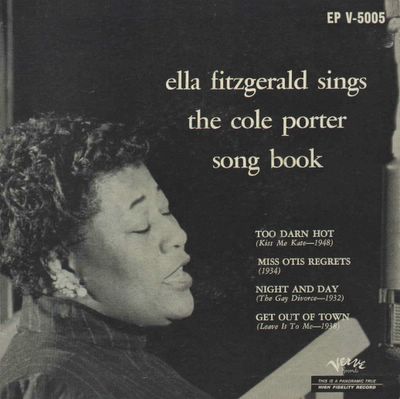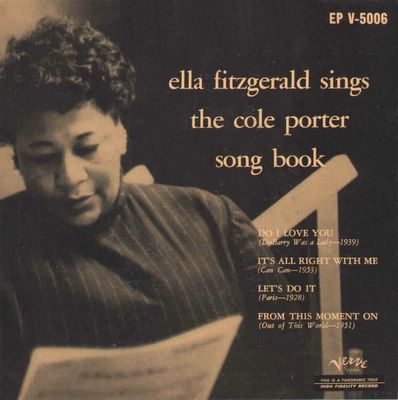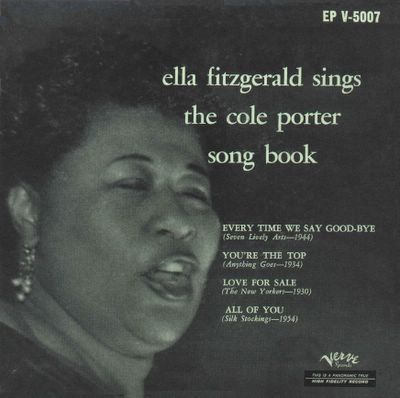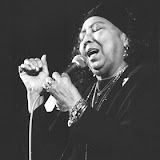Tuesday, December 20, 2005
Concord acquires Telarc!
Preeminent Independent Record Companies
Beverly Hills, CA - The Concord Music Group today announced the
acquisition of Telarc International Corporation. The Cleveland, Ohio-
based Telarc has been a leader in classical and jazz recordings for
over 25 years. Included in the transaction is Heads Up
International, which became part of Telarc in 2000. Heads Up is
known for its highly successful catalog of contemporary instrumental
and world music. Following the recent acquisition of Fantasy, Inc,
this transaction further bolsters the Concord Music Group as one of
the world's largest and most dynamic independent record companies.
Founded in 1977 by musicians and former teachers Bob Woods and Jack
Renner, Telarc has amassed 46 GRAMMY(tm) Awards and a catalog of
more than 1,000 master recordings ranging from classical and
classical-crossover to jazz and blues, from such legendary artists
as Dave Brubeck, George Shearing, Ray Brown, Andre Previn, and Oscar
Peterson. The current jazz roster includes celebrated
singer/guitarist John Pizzarelli and vocalist Tierney Sutton.
Telarc's extraordinary classical roster includes landmark recordings
from the Atlanta Symphony Orchestra and Chorus, the Cincinnati
Symphony and Cincinnati Pops Orchestras, and the Mormon Tabernacle
Choir. Artist-oriented and known throughout the industry for sonic
innovation and super-high quality audio, Telarc became the first
label to commercially use digital recording in 1978, and, in 1983,
was one of the first to launch compact discs in a joint effort with
Sony Corporation. In 2004, Telarc was named Label of the Year by
Gramophone Magazine in the UK.
Heads Up International's roster, headed by founder and label
president Dave Love, includes internationally respected artists such
as Spyro Gyra, Najee, Michael Brecker, The Yellowjackets, and highly
acclaimed world music artists Ladysmith Black Mambazo and Hugh
Masekela. Both Telarc and Heads Up have a significant number of
recordings in high definition and Super Audio Compact Disc (SACD)
format, based on the superior Direct Stream Digital recording
technology.
"The cultures of our companies are very similar and we see lots of
synergies through the merging of our talented staffs and our mutual
goals," says Telarc president Bob Woods. "Glen Barros and I have
known each other for some time and I respect the creative indie
mentality our companies share, which allows us to respond quickly to
the constant change and abundant opportunities in our industry.
We'll be a larger entity, but we won't move slowly. Besides," Woods
added, "Telarc and Heads Up are certain that they will kick
Concord's butt in the company softball game."
Glen Barros, president and CEO of the Concord Music Group, said, "We
are incredibly proud to welcome Telarc and Heads Up to the Concord
family, as we truly admire these great labels. Telarc's history of
impeccable audio and musical standards has made it one of the
world's most respected independent labels and we are honored to be
the ones chosen to safeguard this rich legacy. As with all great
record companies, Telarc and Heads Up are built on a solid
foundation of great artists and great people. We truly look forward
to working alongside Bob Woods, Dave Love, and their talented team
and know that they will make a great contribution toward the
achievement of our mutual goals." Added Barros, "The only thing I'm
worried about is how Bob is going to take the news when he finds out
that there is no company softball game."
The Concord Music Group is one of the world's largest independent
record and music publishing companies, committed to offering
innovative, high-quality popular music. Concord Music Group's family
of labels includes Peak, Playboy Jazz, Stretch, Concord Picante, and
Fantasy Records, which is home to such historic imprints as
Milestone, Pablo, Prestige/New Jazz, Riverside/Jazzland [one word],
Stax/Volt/Enterprise, Specialty, Takoma, and many more. The combined
catalog features over 3,000 albums from such legendary artists as
Charlie Byrd, Rosemary Clooney, Herb Ellis, Stan Getz, Mel Torme,
John Lee Hooker, Little Richard, Gerry Mulligan, Chet Baker, Miles
Davis, Bill Evans, Ella Fitzgerald, Isaac Hayes, Albert King,
Thelonious Monk, Joe Pass, Art Pepper, Otis Redding, Vince Guaraldi,
Sonny Rollins, Sarah Vaughan, Sam Cooke, Count Basie, and Creedence
Clearwater Revival, just to name a few. In 2004, Concord Records, in
association with Starbucks Hear Music, released Ray Charles' final
recording, Genius Loves Company, winner of 8 GRAMMY(tm) Awards
including Album of the Year. The label's current roster includes
GRAMMY(tm) Award-winning artists Gary Burton, Chick Corea, Sergio
Mendes, Ozomatli, Eddie Palmieri, and Poncho Sanchez, among many
others. Peak Records, a joint venture with Concord, is an industry
leader in smooth jazz and R&B and features a stellar artist roster
including The Rippingtons, Gerald Albright, David Benoit, LaToya
London, and Lee Ritenour.
Concord's acquisition of Fantasy late last year paved the way for
the re-signing of rock icon John Fogerty after years of estrangement
from Fantasy. As founder and songwriter of the legendary band
Creedence Clearwater Revival, and throughout a stellar solo career,
Fogerty has written some of rock music's most enduring classics such
as "Bad Moon Rising," "Proud Mary," and "Fortunate Son." The Long
Road Home - The Ultimate John Fogerty - Creedence Collection, was
released on November 1st, 2005.
Concord Music Group is owned by Act III Communications and Tailwind
Capital. HSBC Bank USA, N.A. and JPMorgan Chase provided debt
financing for this transaction.
Thursday, December 08, 2005
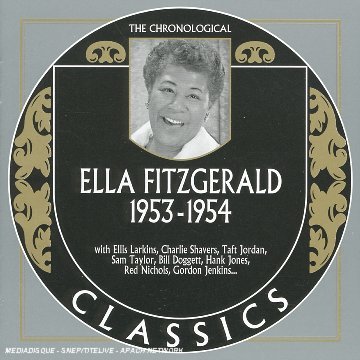
Ella Fitzgerald's 1953-1954 Chronological CD on Classic Label is available! Hooray!!!!!!!!
1. Careless
2. Blue You
3. I Wonder What Kind Of A Guy You'D Be
4. When The Hands Of The Clock Pray At Midnight
5. Crying The Chapel
6. An Empty Ballroom
7. If You Don'T Know, I Know Who Will
8. Melancholy Me
9. Somebody Bad Stole De Wedding Bell
10. Moamin' Low
11. Taking A Chance On Love
12. I Whised Onn The Moon
13. Baby
14. I Need
15. Who'S Afraid
16. I'M Glad There Is You
17. Baby, What Else Can I ,Do
18. What Is There To Say ?
19. Makin' Whoopee !
20. Until The Real Thing Comes Along
21. People Wil Say We'Re In Love
22. Please Be Kind
23. Imagination
24. My Heart Belongs To Daddy


Tony Bennett among Kennedy Center Honorees
NEA Jazz Master Tony Bennett was one of several honorees at this Sunday's Kennedy Center Honors ceremony in Washington, D.C. The celebration lauded the lifetime achievements of outstanding American artists including singer Tina Turner and actor Robert Redford. Bennett was honored with performances by jazz vocalist Diana Krall and trumpeter Wynton Marsalis

Friday, November 18, 2005
Interview -- Ruth Price, Director of The Jazz Bakery, Los Angeles
The Jazz Bakery is a non-profit jazz club. Why did you choose to go with a non-profit business model rather than the more traditional for-profit club?
Because I had never been in business, and the idea horrified me.
So with a non-profit I had a board that could help me open, and I could turn to them with questions. It just seemed like the right thing to do at the time. It's been that way always, ever since we started almost 12 years ago.
And it's called the Jazz Bakery because you're "
Wednesday, November 16, 2005
Wednesday, November 02, 2005
Skitch Henderson, dead at 87
Associated Press, November 2, 2005, 7:13 AM EST
NEW HAVEN, Conn. -- Skitch Henderson, the Grammy-winning conductor who lent his musical expertise to Frank Sinatra and Bing Crosby before founding the New York Pops and becoming the first "Tonight Show" bandleader, died Tuesday. He was 87.
Henderson died at his home in New Milford of natural causes, said Barbara Burnside, spokeswoman for New Milford Hospital.
Born in England, Lyle Russell Cedric Henderson moved to the United States in the 1930s, eking out a living as a pianist, playing vaudeville and movie music in Minnesota and Montana roadhouses.
He got his big break in 1937, when he filled in for a sick pianist touring with Judy Garland and Mickey Rooney. When the tour wrapped up in Chicago, he used the original pianist's ticket and went to Hollywood.
There he joined the music department at MGM and played piano for Bob Hope's "The Pepsodent Show." His friendship with Hope put him in touch with other stars of the day, including Crosby, who became a mentor to Henderson.
He studied with the noted composer Arnold Schoenberg, and Henderson's talented ear brought him renown from some of the era's most successful musicians.
"I could sketch out a score in different keys, a new way each time," Henderson said earlier this year.
That quicksilver ability earned him the nickname "the sketch kid," which Crosby urged him to adapt to "Skitch." It stuck.
During World War II, Henderson flew for both the Royal Air Force and the United States Army Air Corps. At his estate in New Milford, which he shared with his wife, Ruth, Henderson kept a collection of aviation memorabilia. Even at 87, he had said he hoped to fly the Atlantic once more.
After the war, Henderson toured as Sinatra's musical director and lived what he called a "gypsy lifestyle," touring the country with various bands. It was Sinatra's phone call that lured Henderson to New York.
"Frank said, 'I'm moving the "Lucky Strike Show" to New York. Get rid of those gypsies and get back here where you belong,'" Henderson recalled in 1985.
He served as musical director for the "Lucky Strike" radio show and "The Philco Hour" with Crosby. And when NBC moved to television, the studio brought Henderson along as musical director.
In 1954, NBC pegged him as the bandleader for Steve Allen's "Tonight Show," which brought Henderson into the nation's living rooms every night. Even as the hosts changed from Allen to Jack Paar to Johnny Carson, Henderson was a constant.
He founded the New York Pops in 1983, using popular tunes to make orchestral music exciting.
"People come to hear music that's accessible to them -- old songs that are powerful and don't go away," he said.
In 1975, Henderson was sentenced to six months in prison and a $10,000 fine for filing false income tax statements. He was convicted of wrongly reporting that he donated musical scores and arrangements worth $350,000 to the University of Wisconsin in 1969. His defense lawyer blamed the tax violations on bad advice from an accountant.
Even in his late 80s, Henderson maintained a tireless work schedule as music director for the Pops, where he regularly served as conductor. He also was a frequent guest conductor at a number of orchestras around the world.
"I watch the public like a hawk. If I see boredom, I worry," Henderson said. "You can tell by the applause: There's perfunctory applause, there's light applause, and then there's real applause. When it's right, applause sounds like vanilla ice cream with chocolate sauce."
Friday, October 28, 2005
Saturday, October 22, 2005
Shirley Horn is dead

by Richard Harrington
Washington Post, October 22, 2005
No one mined the depths of a lyric the way Shirley Horn did, with a whispery voice that conjured cashmere and cognac. You could lose yourself -- you couldn't not lose yourself -- as the lifelong Washingtonian's dusky alto crawled unhurriedly through time-tested standards and rediscovered treasures, tapestries of song embroidered with her own crisp chords and subtly spun piano filigrees.
Horn's trademark: exquisitely slow tempo and sensitively savored lyric, effortlessly melded. Heart and soul expressed at a piano bench.
Horn, who died Thursday night at 71 after a long illness, could swing a tune with the best of them, and often surprised fans when she did, but that approach simply didn't fit her temperament. Instead, Horn did ballads and cool, understated ruminations better than anyone except her first champion, mentor and lifelong friend, trumpeter Miles Davis. Both were masters of silence and anticipation, but even Davis teased Horn about her pacing. "You do 'em awful slow!" he once said.
Indicating the level of respect Davis had for Horn, the legend, then ailing, accompanied her on the title track of the 1990 album "You Won't Forget Me," the first time he'd recorded with a vocalist in four decades, and Davis did so in the long-abandoned lyrical style he'd defined in the '50s, shortly before he first discovered her. The two were talking about collaborating on an all-ballad album when Davis died the following year. Horn won her only Grammy for 1998's "I Remember Miles," dedicated to Davis.
Another sign of respect came from the great pianist Ahmad Jamal, who accompanied Horn on her penultimate album, 2003's "May the Music Never End." Jamal, one of Horn's early inspirations and models, and himself a master of minimalism, had, in his 55 years of recording, never accompanied a vocalist. But for the first time in her career, Horn was unable to accompany herself on record, the result of losing her right foot to complications from diabetes. It was a significant change, denying Horn use of her piano's expression pedal for controlling the instrument's sustain and quiet features that so defined her sound.
The last few years had been rough on Horn, as she dealt with arthritis and underwent chemotherapy for breast cancer. In June Horn suffered a stroke and had been hospitalized since.
Several years earlier, Horn had been forced to abandon the security of her piano bench and rethink her approach after her voice and piano could no longer be intimate extensions of each other. Last December, just before a brief appearance at a Kennedy Center concert honoring her, Horn seemed weary but as quietly determined as ever, insisting: "I've tried to keep things as level as possible through this whole thing. I'm cool. I know what I have to do: I'm never going to give up the piano, I'm never going to stop singing till God says, 'I called your number.'"
Horn was at times reflective, at times wry, and on occasion caustic and cantankerous. She expressed frustration with the music business, particularly that such pianist-singers as Norah Jones and Diana Krall didn't acknowledge her as the influence she clearly heard herself to be. Motoring around her house in a wheelchair dubbed "the Cadillac" (the fancier "Jaguar" was reserved for concerts), Horn would proudly point to assorted honors, including last year's Jazz Master award from the National Endowment for the Arts. But she also seemed frustrated, reduced to performing only a concert or two a month, backed by pianist George Mesterhazy. "I can't get into the music," she said. "I just get lost."
In recent concerts, she managed to find both humor and pathos singing Paul McCartney's "Yesterday," lending multiple meanings to the line "I'm not half the girl I used to be."
So much about Shirley Horn was glacially slow, from her delivery of a song to the acclamation that came late in her career. You can't really make time stand still, but Horn managed an approximation, insisting that ballads were meant to be played slow, the better to understand the power of the story being told and the emotion of the lyric under exploration.
Horn started studying piano and composition at Howard University's School of Music when she was 12, with dreams of a career in classical music. But the realities of racism in the '40s precluded that possibility, and by the late '40s she'd become immersed in the thriving jazz scene around 14th and U streets NW. Debussy and Rachmaninoff gave way to Oscar Peterson, Wynton Kelly, Erroll Garner and Jamal. The girl piano player began to make an impression in local clubs, but even after forming her first trio in 1954, Horn was not one to advance herself.
In fact, that Horn came to sing at all was part accident -- a patron bribed her to sing "Melancholy Baby" -- and part pragmatism: A club owner gave Horn a raise on the condition that she keep singing.
That Miles Davis became a fan via Horn's 1960 debut album, "Embers and Ashes," was part miracle: few copies were manufactured and they were hard to find. Yet Davis managed to and became smitten, playing it so much at home that his kids could sing along to it. A year later, he invited Horn to open for him at the Village Vanguard, though that opportunity almost passed. When he called her and made the offer, Horn didn't believe it was really Davis. She hung up. But Davis sent her a train ticket to New York, and she went.
It could have been a breakthrough moment, but in the end, it was only a moment. Quincy Jones, who was in the opening-night crowd, would produce a pair of Horn albums in the early '60s but miscast her as a stand-up singer, denying her the comfort of accompanying herself in the trio format in which she was so adept. "Nobody knows how to play for me except me," she would complain. "I need to hear my own chords and set my own tempo."
Wider recognition didn't arrive until 1986, when she signed with Verve and began a string of critically acclaimed albums that garnered nine straight Grammy nominations.
Horn never pursued a career with the single-mindedness of such peers as Ella Fitzgerald, Sarah Vaughan, Carmen McRae or Betty Carter -- she simply wasn't as driven or hard-nosed or forceful. But Horn's records drew stellar guests, and she performed around the world as her health allowed. In the end, Shirley Horn's life was much like her song: She got as much music as possible out of every precious note, and in so doing made each note that much more precious.
Last December, looking back on her life, Horn suggested that she never had a choice in the matter: "I think when I was born, it's like God said, 'Music!,' and that was it. All my life, that's all I knew. It's in me, it's jammed up and it's got to come out."
Wednesday, October 12, 2005
Shirley Horn - some new recordings
But Beautiful: The Best Of Shirley Horn
Album Length Compact Disc
release date 10/11/2005
This new collection celebrates one of the most beloved voices in jazz with songs taken from Horn’s outstanding Verve Records catalog. Three recently-recorded live tunes are also featured on the CD.
Shirley Horn has been part of the Verve Records family beginning with her 1988 release, Close Enough For Love. Her successful relationship with Verve so far has also produced such acclaimed recordings as Here’s To Life and Light Out Of Darkness. The songs collected on But Beautiful were taken from a selection of Horn’s Verve recordings, including these as well as You Won’t Forget Me, The Main Ingredient, I Thought About You, and Loads of Love/Shirley Horn with Horns (originally released on Mercury Records).
I Just Found Out About Love
2. You Won't Forget Me
3. You Don't Know Me
4. The Great City
5. Fever
6. If You Love Me (Really Love Me)
7. A Time For Love
8. Come Dance With Me
9. Nice 'N' Easy
10. But Beautiful
11. Here's To Life
12. Jelly, Jelly
13. Loads Of Love
14. I Didn't Know What Time It Was
I think that no. 1 (for sure), 9, and 12 are the new tunes, recorded live at le jazz au bar, in the last week of 2004. There were plans for a complete album, but obviously only these tunes have made it to a compilation...
Tuesday, October 11, 2005
Tuesday, October 04, 2005
New Forum about Ella Fitzgerald
I've created a new area to discuss Ella. It's here (http://www.freeforumzone.com/viewforum.aspx?f=75542).
My site has a new look also, and new stuff on it (new images in the chronology section, and more dates added as well).
I hope you'll find it useful. Thanks!
Miky
Monday, October 03, 2005
Sunday, October 02, 2005
Saturday, October 01, 2005
Wednesday, September 28, 2005
Saturday, September 24, 2005
Diana Krall - Christmas Album

Track Listing:
1. Jingle Bells
2. Let It Snow
3. The Christmas Song
4. Winter Wonderland
5. I'll Be Home For Christmas
6. Christmas Time Is Here
7. Santa Claus Is Coming To Town
8. Have Yourself A Merry Little Christmas
9. White Christmas
10. What Are You Doing New Year's Eve
11. Sleigh Ride
12. Count Your Blessings Instead of Sheep
This new album will be out on November 1, 2005.
Thursday, September 08, 2005
Oscar Peterson's stamp
Thursday, August 25, 2005
Sunday, August 21, 2005
Sunday, August 14, 2005
Shirley Horn
"I don't know if you know that Shirley Horn is quite ill. She has been moved from hospital critical care to Spellman Nursing Home in DC. She is conscious, but as yet unable to speak. She is on dialysis, breathing assistance and feeding tube. We are hoping for the best."
I checked with Gail -- Shirley most definitely would appreciate flowers, cards, prayers, etc. Here is her contact information and where cards and flowers can be sent:
Shirley Horn
Gladys Spellman Specialty Hospital and Nursing Center
2900 Mercy Lane
Cheverly, MD 20785
Shirley's music has probably touched most of us. If you have a chance, don't hesitate to reach out to her. You'll be giving something back.
Friday, August 12, 2005
Oscar Peterson to be honored with Canadian postage stamp
has certainly earned this honor through his work as a composer,
instrumentalist and accompanist to many great singers (Louis, Ella,
Sarah, Anita, etc.)
JOHN STEWART
THE MISSISSAUGA NEWS
Aug 10, 2005
The new Canadian postage stamp honouring Oscar Peterson will be
unveiled in the presence of the jazz giant himself, on his 80th
birthday.
Canada Post, Universal Music Canada (Peterson's record label) and HMV
Canada are throwing a birthday bash for the king of the keys, the day
the long-time Mississauga resident turns 80.
The birthday party, which includes a "special musical tribute" by a
so-far unnamed guest, will be held Monday, Aug. 15 at the HMV
Superstore at 333 Yonge St. in downtown Toronto beginning at 12:15
p.m.
"This is the first time we've ever been quite so secretive about a
(stamp) design," Cindy Daoust of Canada Post media relations, said
from Ottawa Friday. "We're keeping it pretty close to our hearts until
the 15th."
Daoust said the stamp, which was created by veteran designer Tiit
Telmet, is spectacular. "In my opinion, it's stunning," she told The
News. "It captures the essence of the man and the essence of the
music, and that's hard to do on such an extremely small canvas."
The event will be relatively short with speeches from officials of the
post office, Universal and HMV, the secret musical performer and
comments by Peterson.
He has been the recipient of numerous national and international
awards including the Order of Canada and a Lifetime Grammy Achievement
Award.
Canada Post announced earlier this year that Peterson would become the
first living Canadian ever honoured on a stamp for his lifetime works.
There have been four million stamps printed, and they will be
available Aug. 15.
Sunday, August 07, 2005
Keter Betts R.I.P.
Starting out on the drums, Betts tired of carrying the set up and down the four floors to his family apartment, and in 1946, he switched to the bass. When Betts was only nineteen, he landed his first professional gig, playing for thirteen weeks in Washington, D.C., with saxophonist Carmen Leggio. After touring the country from 1949 to 1951, Betts met jazz singer Dinah Washington and toured with her from 1951 until 1956. The next five years found Betts working in the hottest clubs in the country and touring Europe and South America with Charlie Byrd and Woody Herman. In 1964, Betts joined up with Ella Fitzgerald for a short tour. He would rejoin her several more times, and their career together would span twenty-four years.
Betts has been an instructor of music at Howard University in Washington, D.C., since 1963, and he also instructs young adults through various programs, including the Washington Performing Arts Society's Concerts in Schools and Prince George's County's Arts Alive. Despite appearing in more than 100 recordings, it was not until 1998 that Betts released his first solo album, Bass, Buddies & Blues, and followed it up a year late with Bass, Buddies, Blues Beauty Too.
Betts has been a member of the Smithsonian Jazz Masterworks Big Band and has been inducted into the Washington Area Music Association Hall of Fame. Since 2000, Betts has performed annually at the All-Star Christmas Jazz Jam on Millennium Stage. Betts is widely considered the most respected journeyman bassist in jazz music, and his career continues strong today.
Biography
Legendary jazz bassist William Thomas "Keter" Betts was born July 25, 1928, in Port Chester, New York. While running an errand for his mother while in the fifth grade, Betts came across a parade. Instead of continuing on his way, he followed the parade all over town, entranced by the music. That incident marked the beginning of his love affair with music.
Starting out on the drums, Betts tired of carrying the set up and down the four floors to his family apartment, and in 1946, he switched to the bass. When Betts was only nineteen, he landed his first professional gig, playing for thirteen weeks in Washington, D.C., with saxophonist Carmen Leggio. After touring the country from 1949 to 1951, Betts met jazz singer Dinah Washington and toured with her from 1951 until 1956. The next five years found Betts working in the hottest clubs in the country and touring Europe and South America with Charlie Byrd and Woody Herman. In 1964, Betts joined up with Ella Fitzgerald for a short tour. He would rejoin her several more times, and their career together would span twenty-four years.
Betts has been an instructor of music at Howard University in Washington, D.C., since 1963, and he also instructs young adults through various programs, including the Washington Performing Arts Society's Concerts in Schools and Prince George's County's Arts Alive. Despite appearing in more than 100 recordings, it was not until 1998 that Betts released his first solo album, Bass, Buddies & Blues, and followed it up a year late with Bass, Buddies, Blues Beauty Too.
Betts has been a member of the Smithsonian Jazz Masterworks Big Band and has been inducted into the Washington Area Music Association Hall of Fame. Since 2000, Betts has performed annually at the All-Star Christmas Jazz Jam on Millennium Stage. Betts is widely considered the most respected journeyman bassist in jazz music, and his career continues strong today.


